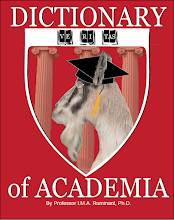March 4, 2009
A private company that sought to help the University of Toledo for a share of tuition revenues has “deferred” its negotiations, citing a lack of “alignment” between faculty who opposed the plan and administrators who embraced it.
In an e-mail circulated on campus Tuesday, Provost Rosemary Haggett lamented the end of talks with Higher Ed Holdings and criticized faculty for their objections.
“The fact that they felt the need to take this action in the midst of exploratory conversations is something I believe reflects poorly on our university because we could not have reasonable dialogue about this proposal,” she wrote. “What could have been a truly compelling dialogue about opportunities to broaden the number of graduate education students benefiting from the expertise of College of Education faculty was never allowed to get under way by those who would seek to demonize those that disagree with them rather than debate what is best for the institution in a thoughtful and professional way.”
Haggett went on to say that she hoped to "begin discussions on other potential models that might help us achieve our mission."
Jon Strunk, a university spokesman, declined to discuss the matter further, saying “the e-mail speaks for itself.”
Tom Evans, vice president of Higher Ed Holdings, did not return a call for comment Tuesday.
The company, which was started by the Texas entrepreneur Randy Best, had proposed a partnership in which Higher Ed Holdings would help the university deliver two master's-level education programs online. In exchange for its support, the company was asking for 70 percent of the tuition revenues the program generated, according to faculty familiar with the negotiations.
Faculty in the college were critical of the plan, saying it appeared to emphasize profit generation over quality. Higher Ed Holdings had promised to expand enrollment in the Curriculum and Instruction and Educational Leadership programs by hundreds of students, relying upon the company’s “coaches” to engage most directly with the students. Through its distance model, which has been implemented already at Lamar University, in Texas, the company planned to offer the degrees for roughly $5,000, about half of what students pay on campus, a faculty member said. In addition to being less expensive, the programs would also have been offered in a compressed time frame.
Faculty reaction to the provost’s e-mail Tuesday was harsh. Leigh Chiarelott, chair of the Department of Curriculum and Instruction, said he thought it was unfortunate that Haggett chose to blame faculty for opposing a deal that raised legitimate academic and financial concerns.
“We’re a little upset by the tone [of the e-mail], the sense that we dug our heels in and we weren’t open to this when in fact pretty much the opposite is true,” he said. “We had hours and hours of meetings and tried to make it work.”
The deal with Higher Ed Holdings was characterized by administrators as part of a broader effort to expand “access,” but meetings with company officials left little impression that Toledo would be reaching new students in underrepresented areas, Chiarelott said. The company was planning to aim its marketing at major cities like Cleveland, Columbus and Cincinnati, he said.
“Obviously that’s where the big numbers are, but the idea of bringing accessibility to the state of Ohio is really a big misnomer,” he said.
Faculty were also concerned about the history of Higher Ed Holdings, which was founded by Best, a major fund raiser for President George W. Bush. Best endured charges of cronyism when he won lucrative federal contracts for testing programs designed by one of his companies. The programs were later criticized for showing little evidence of effectiveness.
A Toledo faculty member, who asked not to be identified, said objections to the company were well founded.
“Although we’re pleased that the administration is going to allow us the time to explore other options, it is disappointing that the [provost’s] letter suggests that the faculty members in the College of Education did anything wrong by wanting to be involved in shared governance, asking questions about data and questioning the reputation of Randy Best with Higher Education [sic] Holdings,” the faculty member said. “Faculty are pleased that the provost is going to have further discussions with us, explore other options.”
Tuesday was not the first time Haggett sparked controversy with e-mail. Last spring, Haggett wrote to President Lloyd Jacobs, advising him not to meet with a faculty group that had voted “no confidence” in their dean, saying that doing so “actually rewards bad behavior.”
Conflict of Interest ConcernsFaculty who opposed going into business with Higher Ed Holdings also raised conflict of interest concerns. Scott Scarborough, the university’s chief financial officer, once sat on the company’s corporate board. Scarborough said he had no financial interest in the company, but that assurance did little to quell criticism that the company was considered by Toledo officials only because of its connections to a key administrator -- not its reputation for quality.
Gregory Stone, an associate professor of research and measurement, said he was relieved to see the deal not go through. That said, Stone supports an expansion of distance learning models, and says he looks forward to more discussion about reform.
“You can look at this as a negative or positive. I tend to look at it as a positive that we want promote new and novel ideas like this,” he said. “But we want to do so in a careful, deliberative and thoughtful way, and not necessary [just focus on] how cheaply we can do this, making the biggest buck.”
Even if the university had hopes of increasing revenues, the plan gave little promise that Toledo would realize much in the way of gains, according to Chiarelott, who analyzed how the proposal might benefit the department he chairs. In order to accommodate the new influx of students that would be required to make the venture profitable for Higher Ed Holdings, the university would incur infrastructure costs that weren’t discussed, he said. Furthermore, there were sensible objections to a public university in Ohio sending 70 percent of tuition revenues to a private company in Texas, Chiarelott said.
“I looked at the financial aspect of this and didn’t see how it would work,” he said.
Students: President “Is A Threat” The debate over Higher Ed Holdings has re-ignited criticism of Jacobs, president at Toledo. Jacobs is taking barbs for an e-mail he sent to the provost, insisting that the next dean of the College of Education be a business-minded leader from “outside the ‘educational establishment.’ ”
Student activists, who had already criticized Jacobs as insensitive to the role of liberal arts at the university, are now calling for his resignation in a critical two-page flier being distributed by the thousands on campus. “Lloyd Jacobs is a Threat to Your Future,” the flier declares in bold black typeface.
The flier gives a laundry list of objections, calling the Higher Ed Holdings deal a plan to transform Toledo into a “diploma mill,” and criticizing Jacobs for his $390,000 salary and generous bonuses. In a call to action, the flier presses students to contact trustees and “tell them Enough Bullshit, Jacobs Must Quit!”
Evan Morrison, a history major who is helping distribute the fliers, said the latest controversy in the College of Education is just another example of Jacobs’ poor leadership.
“This isn’t an isolated event,” said Morrison, a senior. “If we’re able to put a stop to this it would just be a matter of time before something else comes up.”
— Jack Stripling
Original Inside Higher Ed article and reader comments:
Deal Dead in Ohio
http://www.insidehighered.com/news/2009/03/04/toledoThese articles in the Blade may also be of interest:
Company drops discussions with University of Toledo after faculty outcry
http://toledoblade.com/apps/pbcs.dll/article?AID=/20090303/NEWS04/903030252UT professors halt online grad program
http://toledoblade.com/apps/pbcs.dll/article?AID=/20090304/NEWS04/903040338









